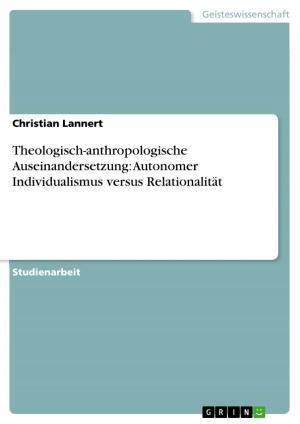Marx, Marxism, and Religion. A Brief Analysis of Interactions through Arguments, Semantics, and Context Awareness
Nonfiction, Social & Cultural Studies, Social Science, Sociology, Marriage & Family| Author: | Arghya Ray | ISBN: | 9783656870234 |
| Publisher: | GRIN Verlag | Publication: | January 5, 2015 |
| Imprint: | GRIN Verlag | Language: | English |
| Author: | Arghya Ray |
| ISBN: | 9783656870234 |
| Publisher: | GRIN Verlag |
| Publication: | January 5, 2015 |
| Imprint: | GRIN Verlag |
| Language: | English |
Document from the year 2015 in the subject Sociology - Religion, , language: English, abstract: Without the fear of contradicting anyone, it can generally be held that academicians worldwide describe Karl Marx as an atheist. This point needs not to be challenged or scrutinised in great depths. The reason is that Marx's personal mentality or intellectual bending does not profoundly affect the making of Marxism and its applications to the real world. The first country to embrace scientific socialism along Marxist lines came into existence in the form of erstwhile Soviet Union. The Soviet Union or the Union of Soviet Socialist Republics (USSR) was a country that began taking shape in the year 1917. However, Marx had died rather long ago, in the year 1883. So any attempt to find a direct, personalised connection between Marx and USSR is nothing but academically irrelevant. This irrelevance is further bulged when it is considered that Marx was especially interested in the affairs of Germany. According to Marx, only well-developed capitalist economies were expected to be at the verge of a socialist revolution (Desai 2004). However, when the Bolsheviks of a backward capitalist country like Russia managed to establish the USSR, Marx's predictions came under close scrutiny by the contemporary thinkers (Desai 2004). In the current research work, the economic importance of this development is not the main focus area. The main focus area is Marxism and religion. The main point of contention is not what Marx thought about religion. Overwhelming majority of scholars think that Marx was a decided atheist. However, the main point of contention is what Marxists should actually do while handling religion. Religion, even in its simplest form, has the capability of manifesting as both personalised and socially dispersed phenomena. While exploring a possible alternative to capitalism, Marxist and pro-Marxist leaders contemplated on various societal issues, which included religion and theology as well (Desai 2004; Lobkowicz 1964). So it is a complex yet necessary pursuit to understand how Marxism needs religion to be handled. If Marxism were completely antireligious, then most of the world's socialist governments would not have allowed religious freedom (at least officially). For example, even the Soviet Constitution did never authorise the state to destroy religion or persecute people on religious grounds (Ginsburgs 1982). This kind of approach cannot be simplified just on the basis of a longing for internationalism.
Document from the year 2015 in the subject Sociology - Religion, , language: English, abstract: Without the fear of contradicting anyone, it can generally be held that academicians worldwide describe Karl Marx as an atheist. This point needs not to be challenged or scrutinised in great depths. The reason is that Marx's personal mentality or intellectual bending does not profoundly affect the making of Marxism and its applications to the real world. The first country to embrace scientific socialism along Marxist lines came into existence in the form of erstwhile Soviet Union. The Soviet Union or the Union of Soviet Socialist Republics (USSR) was a country that began taking shape in the year 1917. However, Marx had died rather long ago, in the year 1883. So any attempt to find a direct, personalised connection between Marx and USSR is nothing but academically irrelevant. This irrelevance is further bulged when it is considered that Marx was especially interested in the affairs of Germany. According to Marx, only well-developed capitalist economies were expected to be at the verge of a socialist revolution (Desai 2004). However, when the Bolsheviks of a backward capitalist country like Russia managed to establish the USSR, Marx's predictions came under close scrutiny by the contemporary thinkers (Desai 2004). In the current research work, the economic importance of this development is not the main focus area. The main focus area is Marxism and religion. The main point of contention is not what Marx thought about religion. Overwhelming majority of scholars think that Marx was a decided atheist. However, the main point of contention is what Marxists should actually do while handling religion. Religion, even in its simplest form, has the capability of manifesting as both personalised and socially dispersed phenomena. While exploring a possible alternative to capitalism, Marxist and pro-Marxist leaders contemplated on various societal issues, which included religion and theology as well (Desai 2004; Lobkowicz 1964). So it is a complex yet necessary pursuit to understand how Marxism needs religion to be handled. If Marxism were completely antireligious, then most of the world's socialist governments would not have allowed religious freedom (at least officially). For example, even the Soviet Constitution did never authorise the state to destroy religion or persecute people on religious grounds (Ginsburgs 1982). This kind of approach cannot be simplified just on the basis of a longing for internationalism.















